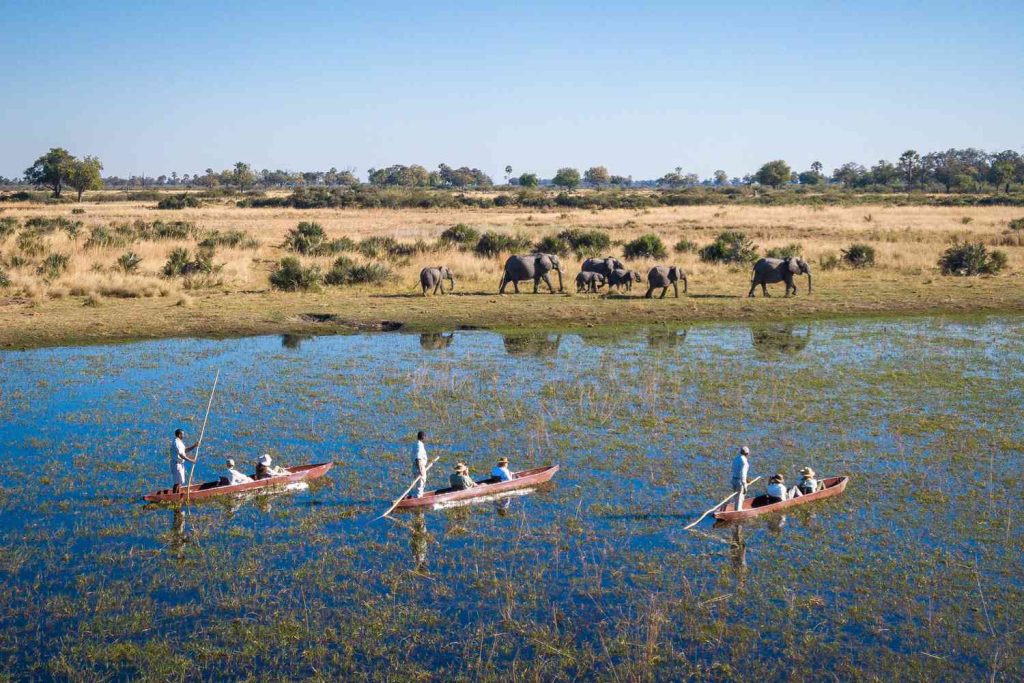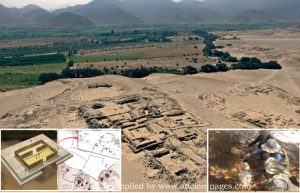:max_bytes(150000):strip_icc():format(jpeg)/TAL-boats-safari-elephants-WILDERNESSBOTSWANA0225-5c5dd2b0dc2b47858dd604d797104d30.jpg)
If the lion charges us, stay seated,” whispered my safari guide, Jonah Seboko, his gaze fixed on a large adult male only a few feet from our car. Just after sunrise, we had peered through blades of golden grass and spotted a male and female lion devouring an adult buffalo. “Some of these animals have never seen a vehicle before,” said Seboko, who has been working at the Wilderness Mokete tented camp, in northern Botswana’s Mababe Depression, since it opened in July of last year. “We must not startle them.”
The Mababe Depression — once an ancient super lake that covered most of northern Botswana — was a grassy plain that flooded from November through March, Botswana’s summer. But that changed in 2007, when tectonic-plate movements caused the Mababe River to start flowing again, eventually creating a 6,400-acre wetland. Formerly animals visited the area for seasonal watering holes, but now the depression is home to big game all year, including elephants, hippos, and 2,000-strong herds of buffalo — a prize meal for lions.
Courtesy of Wilderness
“The Mababe Depression is the only place in Botswana where you can see buffalo herds of this size and where witnessing kill action is almost guaranteed,” Attorney Vasco, community relations manager for Wilderness, told me. “It’s raw and unpredictable out here. People come to feel their heart beating in their chest.”
In hopes of protecting the wildlife of the Mababe Depression for future generations, Wilderness Mokete has leased a 193-square-mile private concession that was formerly used for hunting. “We want to protect these mega herds from hunting and human-wildlife conflict,” Vasco told me. To get there, guests can travel via private helicopter or drive from the airport in the town of Maun.
To minimize its impact on the reserve, Wilderness Mokete has just nine tents and is entirely off-grid: electricity is supplied by solar panels and wastewater is carefully recycled. Rooms, which all have small plunge pools and private decks, are designed in a more minimal style than other Wilderness camps, with accents like white canvas, brown leather, and rope that blend seamlessly with the grasslands’ neutral tones.
To my relief, the lion decided not to charge that day. We returned to camp unscathed for a dinner of beet soup, a stew made from kudu (a species of antelope), and bread-and-butter pudding, served buffet-style in the communal tent. That night I slept under the stars — all the rooms in Mokete have retractable roofs — to the sound of an elephant chomping on the mopani tree outside my tent and the occasional roar of a lion.
Courtesy of Wilderness
Courtesy of Wilderness
The next day we took a helicopter west to Wilderness Tubu Tree, a newly renovated camp in Botswana’s Okavango Delta. The journey was spectacular: I saw great brown- and orange-tinged mopani forests that border Chobe National Park and elephant herds on the scorched desert plains, which stretched on for miles. But the highlight was flying over the Okavango — a vast network of crystalline channels feeding green-blue lagoons that, in late summer, transform the Kalahari Desert into a lush oasis.
When I arrived at Tubu Tree, freshly baked jam tarts and homemade lemonade were being served in the newly built dining room. This open-air, thatched-roof structure overlooks the floodplains of Okavango’s Hunda Island — part of the nearly 150,000-acre Jao Concession, a private reserve bordering the Moremi Game Reserve. Tubu Tree was originally built in 2002; the redesign has introduced a modern look with black granite bathtubs and accents of green and pink sprinkled throughout.
Courtesy of Wilderness
“No Wilderness camp is built to last forever,” said now-retired Tubu Tree general manager Keneth Mukuwa, who worked on the rebuild. “With the new design, we’ve gone from a wheelbarrow to a motorbike.”
Still, Mukuwa assured me that the camp’s original charm remained. Built into a canopy of marula and jackalberry trees, its eight tented suites — now with insulated panels accompanying canvas walls, to protect guests from the heat and cold — are still connected via elevated walkways. On my way to morning and afternoon game drives, I often spotted impalas and warthogs feeding on the forest floor below or a baboon headed to the camp’s compost heap.
Courtesy of Wilderness
I explored the delta’s narrow waterways on a mokoro — a dugout canoe used by the Bayei people to fish and travel between villages — with “Kilo” Ketshephile Sehenye, who is Bayei and has been navigating mokoros through the watery home of hippos and crocodiles since he was 10. “We were the first to discover the delta,” said Sehenye, pointing out marbled reed frogs and lilac-hued water lilies floating on the surface, which the Bayei use for food and medicine. “We know every animal, plant, and insect out here.”
Sehenye and I stayed on the water until late, watching as the setting sun sank behind the plains and turned the inky blue delta into liquid cotton candy. Hippos wheezed and honked in the pools up ahead — luckily the channels weren’t deep enough for them to reach us — and birds of every shape and size, including kingfishers, slaty egrets, and white-breasted cormorants, flitted around, casting shadows on the glassy surface.
I wanted that sunset to last a little longer, to savor the Okavango Delta’s magic for just a few more minutes. But my wake-up call for the next day’s walking safari was 6 a.m., so dinner back at camp and an early night beckoned. Had they not, I might have stayed forever.
A version of this story first appeared in the February 2025 issue of Travel + Leisure under the headline “As The River Rises.”








